
A complete predicate is the part of a sentence that contains the verb and all of the words that modify the verb.
If words like “complete predicate” bring up nightmarish memories of your third grade class, have no fear.
Today, we’re breaking down exactly what a complete predicate is and how to identify it in a sentence.
What Is a Predicate?
To understand what a complete predicate is, we first need to define what a predicate is.
A predicate is the part of a sentence that contains a verb or verb phrase. It does not contain the subject (“who” is doing the action).
A complete predicate is just a more specific type of predicate that also contains any words that change the meaning of or add to the verb.
First, let’s refresh our memory on verbs.
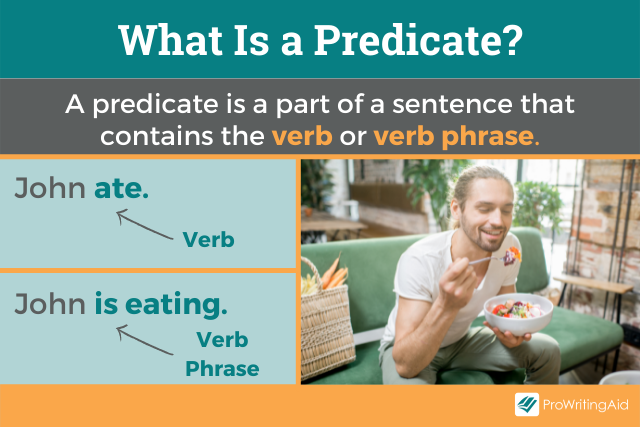
What Is a Verb?
A verb is a word that shows action or a state of being.
Action verbs include words like jump, run, watch, or cook. Verbs can change based on their tense or mood.
Sometimes action verbs require a helping verb for them to make sense. A verb phrase is the combination of any helping verbs and action verbs.
For example, in the sentence, “John is eating,” the action verb is eating and the helping verb is is. When you put these together, you get the verb phrase “is eating”.
Here are some more examples of verb phrases:
- Have eaten
- Did run
- Was swimming
- Might cook
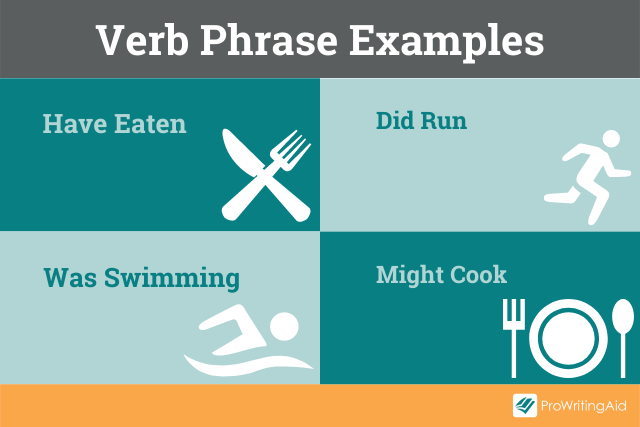
ProWritingAid's Thesaurus Report can help you identify verbs in your writing.
You'll see all the verbs, adjectives, adverbs, and nouns in your writing. When you hover over a word, the report will show you relevant synonyms so you can make your writing as precise and engaging as possible.
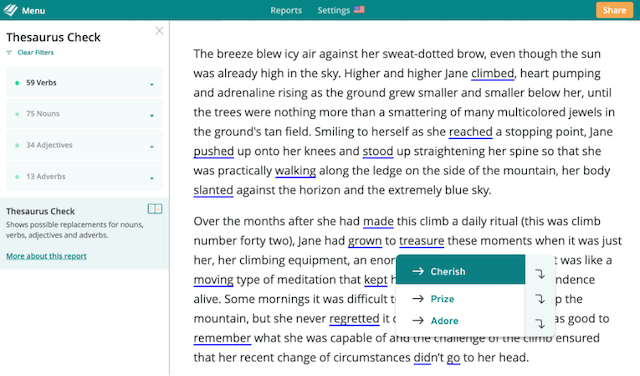
Try the Thesaurus Report with a free ProWritingAid account.
So how can we use verbs to work out where the predicate is?
How Do You Identify a Predicate?
The predicate of a sentence contains the verb or verb phrase.
In other words, the predicate is “what” the subject is doing. It gives more information about the subject.
Take a look at this sentence: “John ate.”
John is the subject. He is who the sentence is about.
Ate is the predicate because it’s the verb—the action that John is doing.
Predicates can be simple or complete. But don’t worry! Just because a complete predicate isn’t “simple” doesn’t mean it’s not easy to understand.
What Is a Complete Predicate?
A complete predicate contains the verb or verb phrase plus all the words around it that provide extra information or modify the verb.
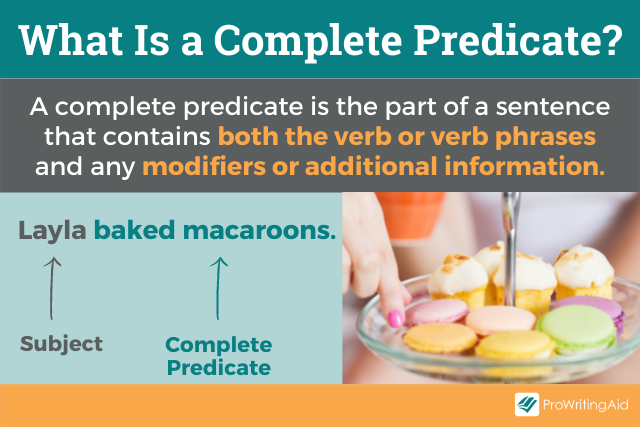
Here's another example:
“John ate a hot dog.”
The subject is still John.
The complete predicate is “ate a hot dog”.
The hot dog is related to the verb ate because it gives us more information about what was eaten.
We don’t speak or write in just two-word sentences. We usually give additional information about the subject and the verb.
This information can come in the form of direct or indirect objects, adjectives, prepositions, and adverbs.
The complete predicate contains all of this information and the verb or verb phrase.
Returning to our previous example, we know that in “John ate a hot dog,” the complete predicate is “ate a hot dog”.
The extra information is a direct object: “hot dog”. We also include the word "a" in our complete predicate because it also gives us more information about the verb; it tells us how many hot dogs were eaten.
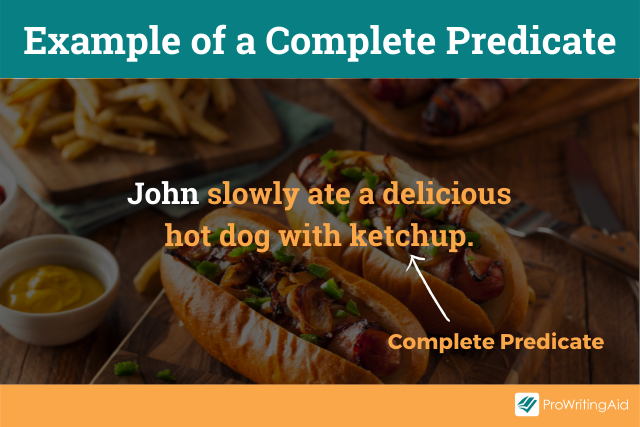
How Many Words Are in a Complete Predicate?
There is no set number of words in a complete predicate. All of the words that modify the verb are included.
We can provide more information about the hot dog. Take a look at this sentence:
“John slowly ate a delicious hot dog with ketchup.”
In this sentence, the complete predicate is “slowly ate a delicious hot dog with ketchup”.
There is an adverb (slowly), an adjective (delicious), and a direct object with an extra noun (ketchup).
All of those words are part of the complete predicate because they all provide more information about what John ate.
What Is the Difference Between a Simple Predicate and a Complete Predicate?
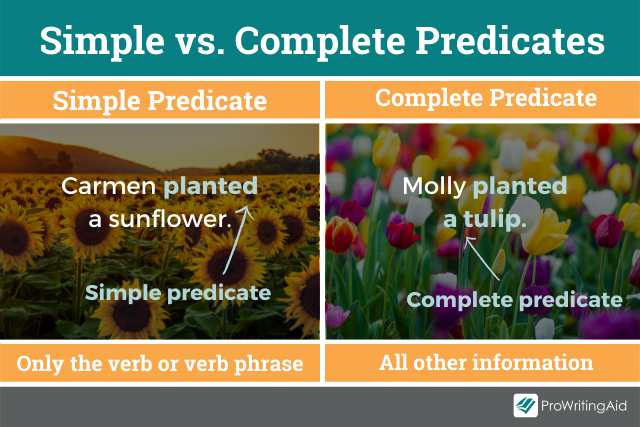
While a complete predicate contains all the words around the verb, a simple predicate only contains the verb or verb phrase.
In the sentence, “John ate a hot dog,” the simple predicate is “ate”. It’s just the verb.
A simple predicate can also be just the verb phrase. For example, if we say, “John has eaten a hot dog,” the simple predicate is “has eaten”.
If we include the part about the hot dog, then it becomes a complete predicate.
Sometimes a simple predicate and a complete predicate are the same if there are no other words describing the verb phrase.
If the sentence is, “John has eaten,” then both the simple predicate and complete predicate are “has eaten”.
This only happens when there is no additional information in the predicate.
What Is the Difference Between a Complete Predicate and a Compound Predicate?
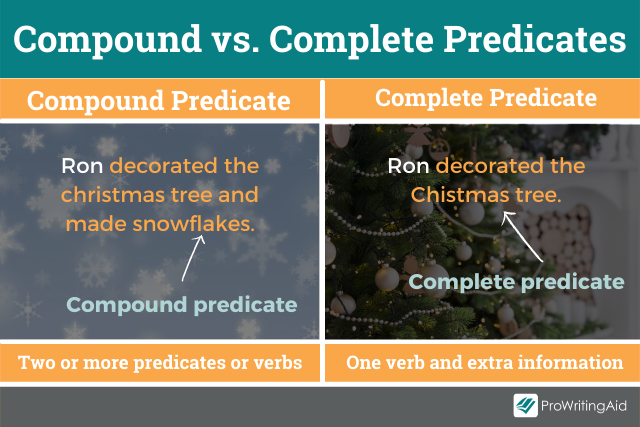
Some sentences also contain compound predicates. Complete and compound predicates are different from each other.
A compound predicate occurs when a sentence has two or more different verbs connected to the same subject.
A compound predicate can contain two or more simple predicates, complete predicates, or a combination of these.
Let’s return to our examples with John. A good hot dog needs a drink to go with it, don’t you think? Take a look at the following sentence.
“John ate a delicious hot dog and drank a cold soda.”
There are two verbs attached to the subject: ate and drank. These two verbs are an example of compound predicate.
There are still two simple predicates, which in this case are just the verbs ate and drank. The two complete predicates are “ate a delicious hot dog” and “drank a cold soda”.
Together, these two complete predicates tell us what John did, so they make a compound predicate.
Remember, a complete predicate has the complete information while a compound predicate compounds two predicates.
How Do I Find the Complete Predicate in a Sentence?
Once you understand what a complete predicate consists of, it’s much easier to locate it in a sentence.
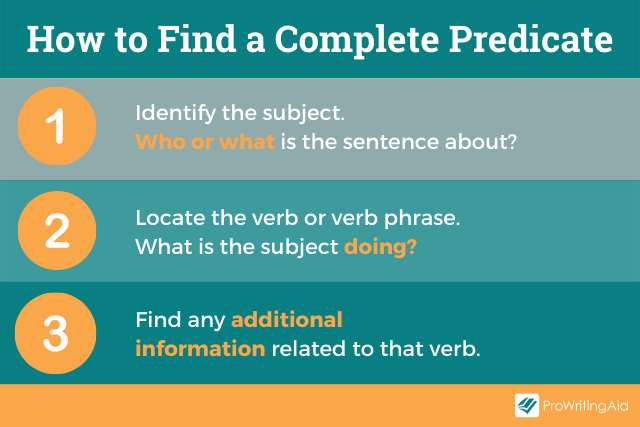
Follow these steps to find the complete predicate.
- Identify the subject. Who or what is the sentence about?
- Locate the verb or verb phrase. What is the subject doing?
- Find any additional information related to that verb.
That’s it! You might find it helpful to circle the verb, underline the predicate, or draw a line separating the subject from the rest of the sentence until you get the hang of it.
Unless you’re channeling your inner Yoda, the predicate typically follows the subject.
The green Jedi Master likes to invert his sentence structure (“The greatest teacher failure is”), but thankfully English is usually much simpler than that!
Easy it is. Smart you are. Ready to practice, Grammar Jedis?
What Are Some Examples of Complete Predicates?
Let’s take a look at some sentences to find the complete predicate in each. The highlighted part of the sentence is the complete predicate.
- The little girl read 100 books last year.
- My Scottish terrier Franklin loves to play fetch.
- Jane and Kevin have been traveling for a year.
- I am cooking curry tonight.
- Without a second thought, the woman sent in her resignation letter.
- We have never run a 5k.
- My new computer is updating.
- Christmas was his favorite holiday.
Now it’s your turn. Can you find the complete predicate in each of the examples below?
- The vacuum broke.
- The newlyweds went hiking in the mountains.
The Jedi Master used the Force.
The first sentence has a very short complete predicate: “broke”.
The complete predicate in the next sentence is “went hiking in the mountains”.
And the answer to the third sentence is “used the Force”. How did you do?
Speaking of Jedis, ProWritingAid’s blog has tons of information to take you from Grammar Padawan to full-fledged Grammar Jedi Master.
Check out our in-depth article on verbs to learn more about how to use action words in your sentences.
Remember, a complete predicate isn’t just the verb phrase; it’s everything that modifies or adds information to the verb!
That’s everything you need to know about what a complete predicate is and how to find it. We hope you now have a clearer understanding over this crucial part of a sentence.


